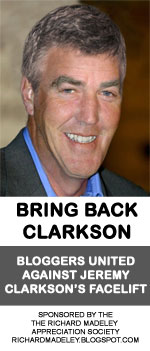Richard writes: "When I drunkenly stumbled into Professor Martin Amis at Maureen Lipman's cheese and wine party last month, I was ready to blame an excessive number of elbows in the room for my slight trip. The last thing I wanted to do was pay for the dry cleaning of an expensively ruffled jacket and corduroy trousers. I needn't have worried. Martin laughed off the stain, which he said delighted him because it was the same shape as the mole on Philip Roth's thigh, and instead asked me for an interview. The deal was struck there and then, and this is the result."
An aluminium bullet propelled me from Manchester to London. It carried the cordite stench of the intercity commuter train; a two hundred mile per hour slug rattling around the cranial cavities of canting fools whose scything fingers lay waste to lines of unkempt prose and words that die minuscule deaths between the covers of business reports, feasibility studies, and the cadaver-like morbidity of the end of year accounts. Solzhenitsyn one wrote of the moment when the 'soul, which formerly was dry, [...] ripens with suffering'. I was about as far from the Gulag Archipelago as you could get but I was also on my way to watch a man ripe with rich agonies of his very own.
An hour later, I'm sitting watching cameras shuffle softshoe across the floors of a subdued studio in South London. I've become enchanted by the insoluble piety of the place. At my side, sits a devote woman and her flask. She is knitting a cardigan big enough for a Sherman tank. She tells me that her name is Brenda before she turns to me, mid-purl. 'It's for Richard,' she says, her breath scorched by hot Darjeeling. 'He always looks so cold.'
The Richard in question is Richard Madeley, talk show host, polymath, and the man credited with the discovery of butane. 'That was many years ago,' he smiles when I later remind him of his origins in petrochemicals. 'I was trained as an organic chemist. Judy says it's now chemistry of a different kind but I still find it odd to be working in daytime television. I miss my pipettes.'
I want to tell him that he does more than work in daytime TV. To women like Brenda, he is the daytime. Though not for very much longer. He has invited me here to record the end of his decade-long imprisonment. I'm there to act as his witness: to sit and attest to his virtue in this tabernacle built for Brenda and the other knitting Gods of Middle Age. Bearing witness would be easier if the master of the television talk shows approached his premature retirement with a little more dignity.
I had found him stalking menacingly at the fringes of a circle of producers. Richard is a beast of capacious energy, occasionally lashing out at any who dare invade his space. One of the show's researchers runs away, her sobs echoing long after Richard had rebuked her for bringing him Marmite instead of coffee. Caffeine is his drug of choice. It's why I took my seat beside Brenda. Caffeine addicts are better left in their zone of jittery expectation. An hour later, I'm still there, watching Richard finish another show.
'Great show, guys! We should get that paraplegic brass band on again,' he announces as he drops down off the set and waves me over. His wig has slipped. I haven't the heart to tell him. Friends had advised me that he's a man whose vanity gorges on his charm. He lives an eccentric's life; dashing between emergencies as unnatural as his brow that never sweats, even when layered with a hairpiece weaved from the bristles of a mildly albino badger. On the phone earlier that morning, he had explained how Stephen Fry had helped him shave his head during a orgy of Taxi Driver and drunken self-loathing. In the flesh, this Travis Bickle has a cheerful, matter-of-fact voice that allies itself with the twinkle in his eye. He's a man fit for psychotic episodes. His humour attests to it in every act of passive aggression. When not directed at himself, it yawns in the face of absurdities that surround him. I tell him that he reminds me of Normal Mailer.
'When I started out, I only wanted to write like Mailer,' he tells me in his changing room. He has a habit of saying things he thinks other people want to hear. He knows I write novels so I'm treated to the Richard who should rightfully have won the Nobel Prize for Literature. 'Mailer was a model for how I've lived but my novels are more like something that Saul Bellow would write. Who would publish them? I'm not Jewish enough to be properly recognised as a Jewish novelist.'
I ask him how Jewish he is and how Jewish he wishes he was.
'I'm not at all Jewish,' he confesses. 'Except when I write. Judy compares me favourably with Howard Jacobsen. So does Howard Jacobsen. Howard Jacobsen thinks I'm Jewish.'
It's ingratiating and I'm tempted to ask to see the manuscripts. Does the man have prose as tight as the skin of his forehead? I feel almost transparent beside him; a glyph of anti-health and tobacco rot. Bellow would find it amusing watching this man freely handling his pelt while claiming to be the literary success to Herzog and Augie March. I want to tell him this but Richard's mind is already elsewhere. A parcel has been delivered to the door and he cannot wait to open it.
'Another stuffed heron,' he laughs, perching the cheap doll on the hardwood cliff of his table. 'It's for Bill Oddie. Ever since I mentioned that he's been speared through the thigh by an errant heron, his fans have been sending me these.'
It's clear that fans mean more to Madeley than he admits. To him the recognition is more than cant. Fans are important to the mystique of the man who lets it know that he wears no underpants and never locks the bathroom door. The psychology of the anal retentive is like cheap aftershave and it would be an insult to accuse him of wearing it.
'My fans tend not to come out in daylight,' he laughs. 'I'm not a fashionable wit like Stephen Fry. It's why I'm so often misjudged and people don't like me mentioning my friends in conversation. I don't know what people expect: that celebrities don't live near each other? That men like Stephen wouldn't search me out for a game of Scrabble. Some people find it difficult to believe that Ronnie Corbett lives next door. If I ever wrote that over forty celebrity friends live within a mile of our house, I'd be crucified.'
Crucifixion focuses his eyes and subconsciously he rubs stigmata on his palms. Would it be too easy to say he has a Christ complex? It's the interviewer's prerogative to avoid asking difficult questions when you feel an affinity for a subject. And it's hard not to feel for Madeley. In Manchester, delivering my yearly lecture to young writers, somebody had mentioned the blog that has become a byword for self-destructive journalism. It's called The Richard Madeley Appreciation Society. Humble it is not.
'Writing my blog has allowed me to reach out to people I'd normally cross the street to avoid,' he says. 'A few are a little psychologically unbalanced but I find that's the world. On some days, two hundred people drop by and read about my life. I love them all. Even those that drop by to call me a twat...'
A tear pools in his eye. Pure liquid sympathy. I dare not put it to him that two hundred readers are a piffling number, especially when most of them are there to abuse him. Reading through the names of his regular visitors is like reading out a roll call for a multiple personality disorder. AxmxZ, Selena Dreamy, Elberry, Hope-Athlete, Mutleythedog, Lola, Bertas and The Twitch. I suspect they are all the product of a single mind. When his contract ends, I expect the inevitable breakdown to begin with the cry: 'I am Richard Madeley and I am legend'.
Ruefully, he pops a pink bonbon in his mouth and I hear it crack between white porcelain before he begins to talk of Bill Oddie with great affection. His regard for his celebrity friends marks Richard out as something more than a good guy. He's a patron saint of lost comedians, failed and forgotten actors, and the detritus of showbiz.
The enigmatic hold that Bill Oddie has over Richard's career cannot be fathomed in the time I had with him. All I can do is tell him about the moment my own father introduced me to The Goodies. Kingsley called them 'Britain's response to Baudelaire' but my teenage sympathies lay eastward. There was never any doubt to an impressionable teenager that Bill Oddie was the voice of the anti-establishment and that his comedy was a vehicle for radical liberalism originating behind the Iron Curtain. In his bright red dungarees and lime green vest, he influenced me more than any other artist. I was seduced when still pubescent by guns firing tomato sauce and enormous cats. Later, when on the nadir of my own greatness, Bellow and Updike would efface Oddie from my life. In Madeley, I see a man who chose a different path. Young Amis smiles from his eyes and expresses it better than ever I can.
'Bill's a brainy little gnome,' he says with obvious affection.
I want to tell him that the brainiest little gnome is sitting before me, adjusting the wig on his suntanned brow. In this world of febrile sensibilities, where fashion is as disposable as the cant, Richard Madeley is the last link to homo celebritus. The moment passes too quickly. A knock on the door and I'm introduced to Judy, who doesn't seem to recognise the genius she berates for wearing his fly wide open.
'She's always telling me off about that,' he said, tucking himself away.
'Don't worry,' I reply. 'Norman Mailer always had the same problem. It's what comes of being a great Jewish novelist.'









